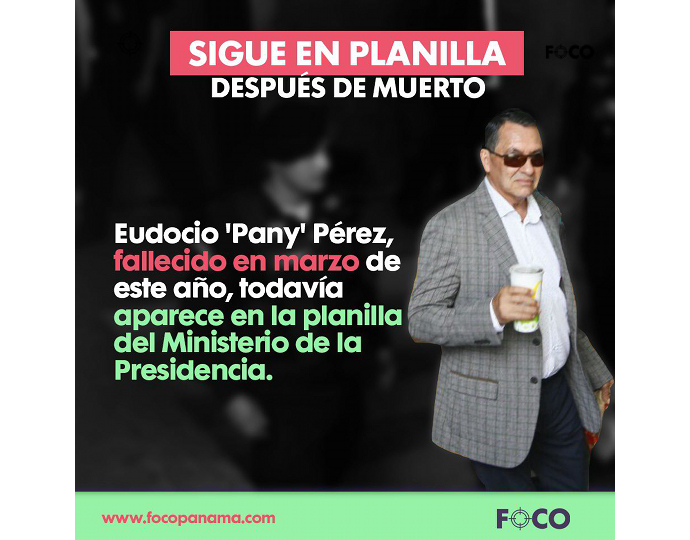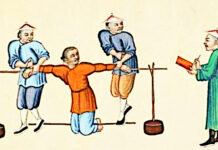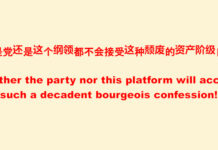One of the historic abuses — and abuses of history — that has existed in Panamanian law is the notion that it can be a crime punishable by prison to defame a dead person. That specific possibility was written out of the law several years ago, but without an explicit bar on such prosecutions. The former mayor of La Villa de Los Santos, who died this past March, was found listed on the Ministry of the Presidency’s payroll this September. The young and increasingly noticed online journal Foco took notice and published the above — which is true, or was at the time. There could be many an innocent explanation, but there are also historic practices that are not so innocent. Foco did not accuse any individual of a crime. A false allegation that someone committed a crime is the essence of calumnia, half of what is usually referred to as the calumnia e injuria law. The other half, injuria, is making somebody look bad in the public eye. Strictly speaking, truth is not a defense. However, Panama is a party to human rights treaties that would bar a conviction for injuria when the story is both true and a matter of public interest — as in what’s going on in the government. There are other ways to harass journalists, though. The late politician’s son has announced a lawsuit for $30,000 for injuring the reputation of the deceased. Graphic from Foco.
Turbulence and decay in Panama’s politics and media taken out on the small press
by Eric Jackson
It used to be that there was a powerful cartel of about a half-dozen or less ad agencies that wielded tremendous power. They told the TV stations what programs were acceptable, the real estate developers which races of people could or could not appear on their billboards, the newspapers who would or would not get the prized advertising clients.
Then, as a worldwide phenomenon that owes a great deal to Google and Facebook, advertising-supported communication media collapsed as a business model. A few of the giants survived by gobbling up competitors or diversifying into other lines of business. Some of the media were acquired by billionaires to whom profits were not so important as vanity. A lot of news organizations, and many an entertainment medium, went through painful cost-cutting.
(Reality TV? Influencers? Some people get well paid, but these insufferable personas are cheap compared to the costs of the way things were done. The wretched products are noticeably inferior to those who see and care about such things.)
Now, with Panama’s ad agencies largely subsidiaries of US-based companies that are themselves endangered, with Panamanian media increasingly captured by political parties or beholden to foreign interests, the opinion-making biz ain’t what it used to be. What a time for a medical crisis that collapses the Panamanian economy, and a moral crisis that has collapsed the credibility of Panama’s political caste notwithstanding partisan boundaries.
We are in such a time. The state, and now with an attempt by the church to get in on the action, dominate the sources of information like never before. Government announcements, police trophy photos of the latest drug seizure and the archbishop’s declarations of what’s right and what isn’t — this is supposed to be our daily information feed.
What’s a demagogue looking to increase his or her following to do? Set up “call centers” of trolls who spread bile about whatever other side wherever it can be spread. Get some sort of government funding for private propaganda aimed at personal benefit. Build up some low-talent relative as an “influencer” and get his or her endorsement. It’s all pretty vacuous. People sense that and buy fewer newspapers, avoid subscribing to get past the old mainstream papers’ pay walls, turn off the old TV networks, and go surfing online.
It’s hard to sustain a vacuum, though, and into the empty spaces come the social media and a bunch of small and micro news organizations. A bunch of the emerging sources are no longer so new. Some of them are folks from the old paradigms — CBS News may have washed its hands of Dan Rather and MSNBC may have discarded Cenk Uygur but they live on in their own media. As do, on the Panamanian scene, folks like Ebrahim Asvat and Mauricio Valenzuela.
It’s a problem for political dynasties, government agencies, rabiblanco media barons and those who consider that by holy anointment or superior bloodlines their stories are all that matters and all that ought to be told. So the state, and now the church, instead of educating people on how to determine what is fake, instead of going down into the trenches to call out social media falsehoods that can get people killed, run this facile argument that if information is not from them, it’s false.
Yet the piranha school of small media nibble away, much to the discomfort of those in high places, especially those who flaunt bad behavior on the presumption that nobody who is anybody will talk about it.
And seeing how the anointed ones act, there are these social media imitators. You often don’t know the “who” of upstart or breakaway “movements” with no identified leaders and tiny followings, which also try to invoke authority against the small media. You can generally figure out the “what” by looking at the messages they put out.

Ah, the nationalist ploy, by an anonymous “movement” with 19 followers. Garden variety US-inspired religious right, it appears. Is it one of the same old demagogues’ new additions to its cast of social media trolls? Notice to whom they address their “nationalist” plea.
Contact us by email at fund4thepanamanews@gmail.com
To fend off hackers, organized trolls and other online vandalism, our website comments feature is switched off. Instead, come to our Facebook page to join in the discussion.
These links are interactive — click on the boxes












